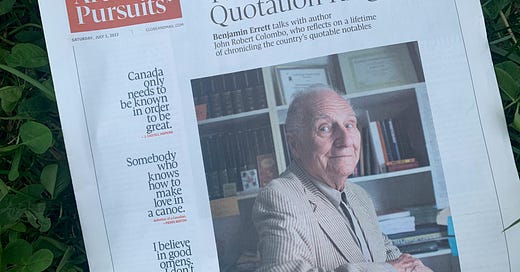Twilight of the Master Gatherer
John Robert Colombo reflects on a lifetime of chronicling Canada’s quotable notables
Published in The Globe and Mail, July 2, 2022
John Robert Colombo made a career overestimating the curiosity of the Canadian people.
That’s his line, not mine, and it’s important to get the citation right because he’s spent a large portion of his 86 years accurately connecting quotations to their speakers. Colombo commented on the financial futility of these ventures in this newspaper in 1984, when he was being interviewed about the five (five!) books he would publish that year alone.
“Economically, you’d have to say I’m unsuccessful,” he told The Globe and Mail back then. Sixty books into his career, he cast doubt as to whether he’d be able to keep it up. Readers needn’t have worried; he passed the 200 mark years ago. He readily admits that financial success was never the goal.
“I see myself as a popularizer,” he told me in the backyard of his north Toronto home recently. “I take things unknown and suggest that they are stage centre.”
His greatest success was Colombo’s Canadian Quotations, a 735-page landmark that compiled thousands of utterances by Canadians or about Canada. First published in 1974, once a Canadian reference shelf classic, and now sadly out of print, it was born from Colombo’s thirst to understand his homeland. The result earned him the title of Canada’s Master Gatherer (bestowed upon him by poet Robin Skelton, as he’s quick to acknowledge).
“Growing up in an industrial city like Kitchener in Southern Ontario meant that I had to struggle to gain a sense of the country,” he recalls. “Collecting historical and also contemporary remarks was my stepping stone to establishing a sense of the building of the country’s verbal culture and hence intellectual and artistic expression. I did it the hard way, buying 6,000 three-by-five cards and filling them out and arranging them topically: a vast mosaic of expression.”
A lifetime collecting every good thing ever said about Canada appears to be a terrific way to keep your wits about you, as evidenced by Colombo’s detailed responses to my questions. Although some of the names don’t come to him as quickly as they used to, Colombo proudly recalls that in his quote-gathering prime, he was unbeatable.
“I could not be defeated at a cocktail party. On a national tour, someone would say, ‘There’s nothing in your book on Madawaska,’ and I’d respond with the line and page number.”
When asked about the state of Canadian culture today, Colombo sighs. ”I feel the direction the country took in the 1960s was the right one for us, but thereafter it has been short-circuited, more so today than ever before, and the country’s promise has been lost or misplaced.”
Where, exactly, did we go wrong? I pressed him for a specific time and date, and he produced one: July 9, 1982, when Dominion Day was formally renamed Canada Day. The symbolic move via a private member’s bill in Parliament was “done in a stealthy fashion by the Liberal government.”
“That’s when the helium went out of the Canadian balloon,” Colombo said.
As a lover of country and language, it was a double betrayal for him, representing the “loss of an idiom” and a “willingness to throw away a useful word.”
If the past is a different country, the Canada he chronicled is doubly so. The journalists and personalities who fill its pages are largely forgotten. Globe columnist Richard J. Needham stands over the pages of Colombo’s New Canadian Quotations (1987) like a colossus, with more citations than Lester Pearson. Still, Colombo worked to create a diverse pantheon, researching Indigenous folklore and publishing five books on the subject. His Canada includes everyone he can track down, which explains his graphomania. To borrow a line from Robert Caro, another prolific 86-year-old writer, he’s turned every page.
Colombo continues to write “poems and effects,” producing an annual volume of self-published new work. He also maintains an expertise in the mystical and occult, a mildly lucrative sub-genre of his oeuvre. But his north star remains clear: “We should remember remarkable men and women who once made or now are making distinct contributions to the world.” Books of quotations are perhaps no longer the best way to do this, if they ever were. But for any interested publishers, a revised version of Colombo’s Canadian Quotations – his next distinct contribution to the world – is ready to go.
The Condensed Colombo’s Canadian Quotations.
“Canada only needs to be known in order to be great.”
– J. Castell Hopkins, writer and nationalist, 1901. Colombo’s maxim
“Every generation of Canadian nationalist intellectuals seem fated to play the part of Sisyphus.”
– Ramsay Cook, Saturday Night, 1970
“A deer, although toothless, may accomplish something.”
– Tsimshian proverb
“I did? I finished?”
– Marilyn Bell, 16, on Sept. 9, 1954, after swimming across Lake Ontario.
“Literature is conscious mythology.”
– Northrop Frye, and the one quip Colombo specifically requested appear in this piece.





